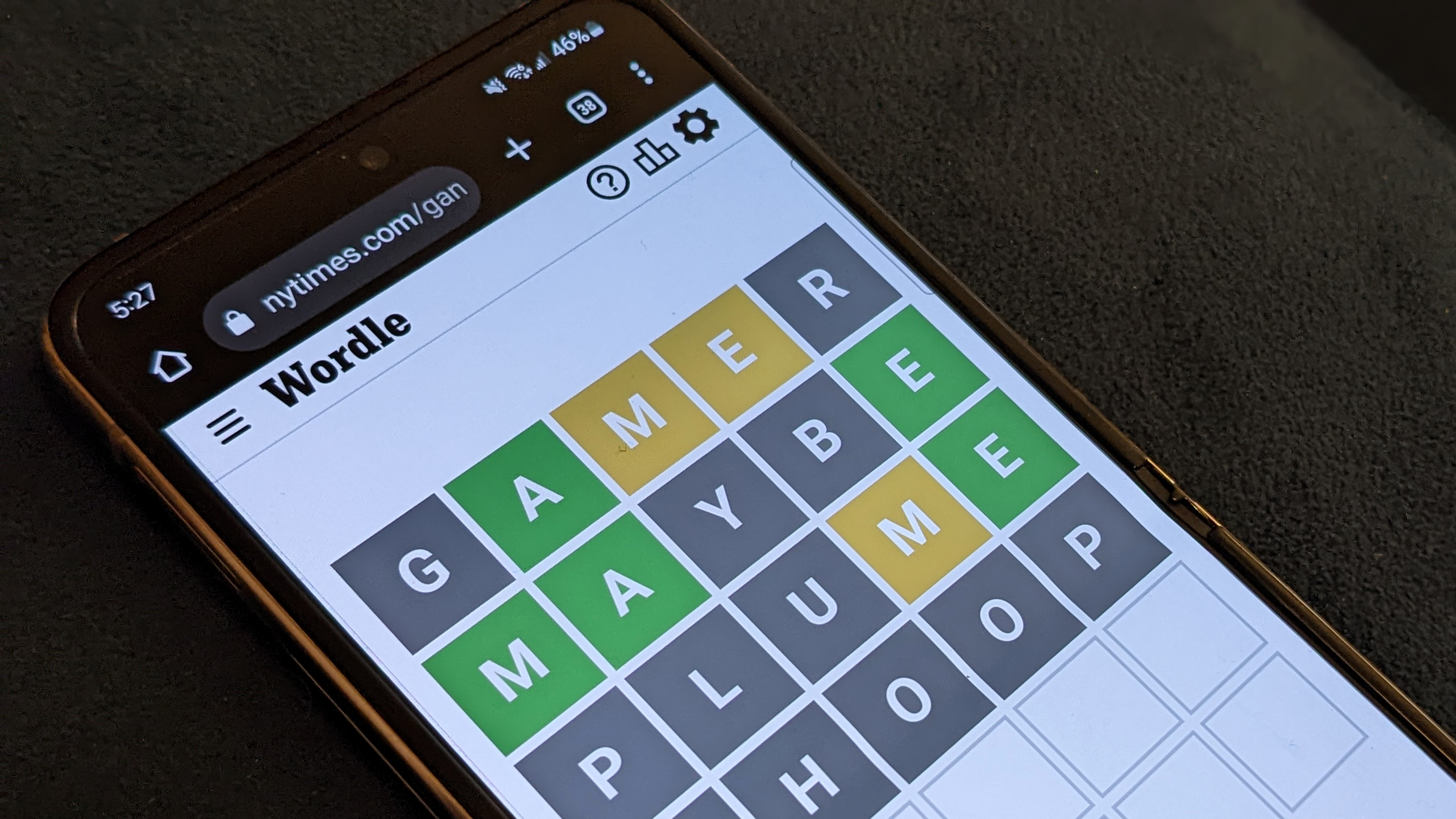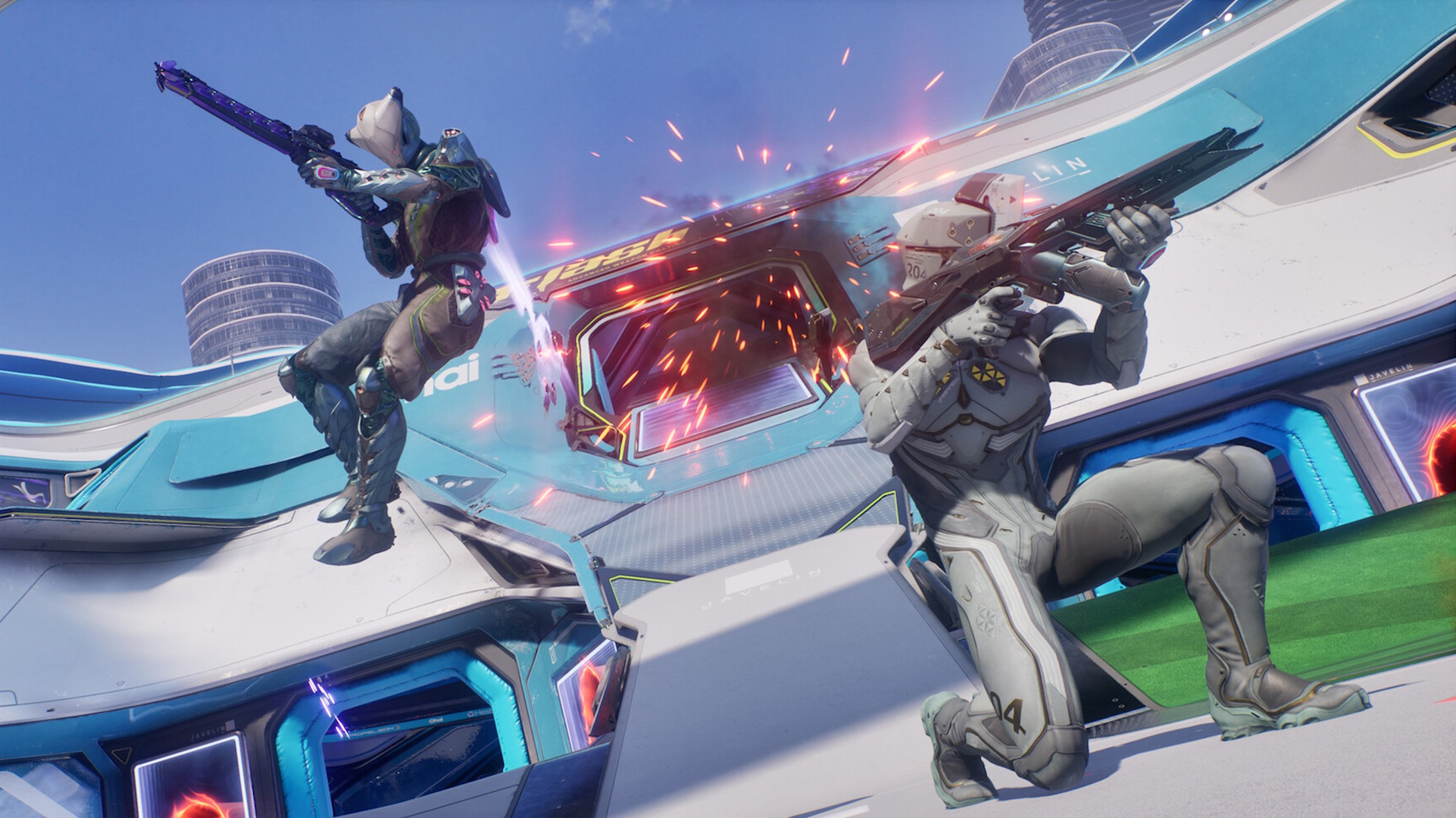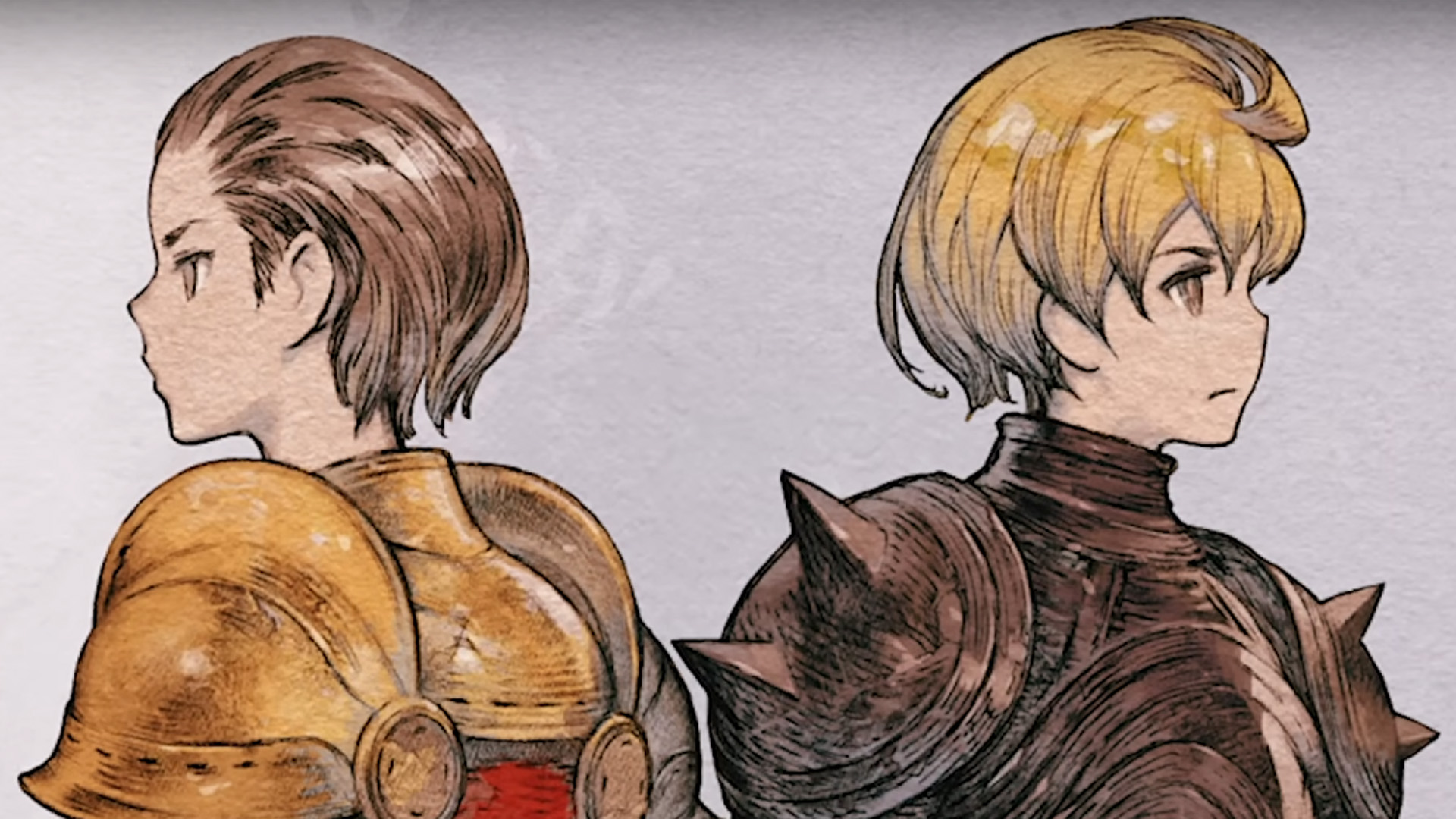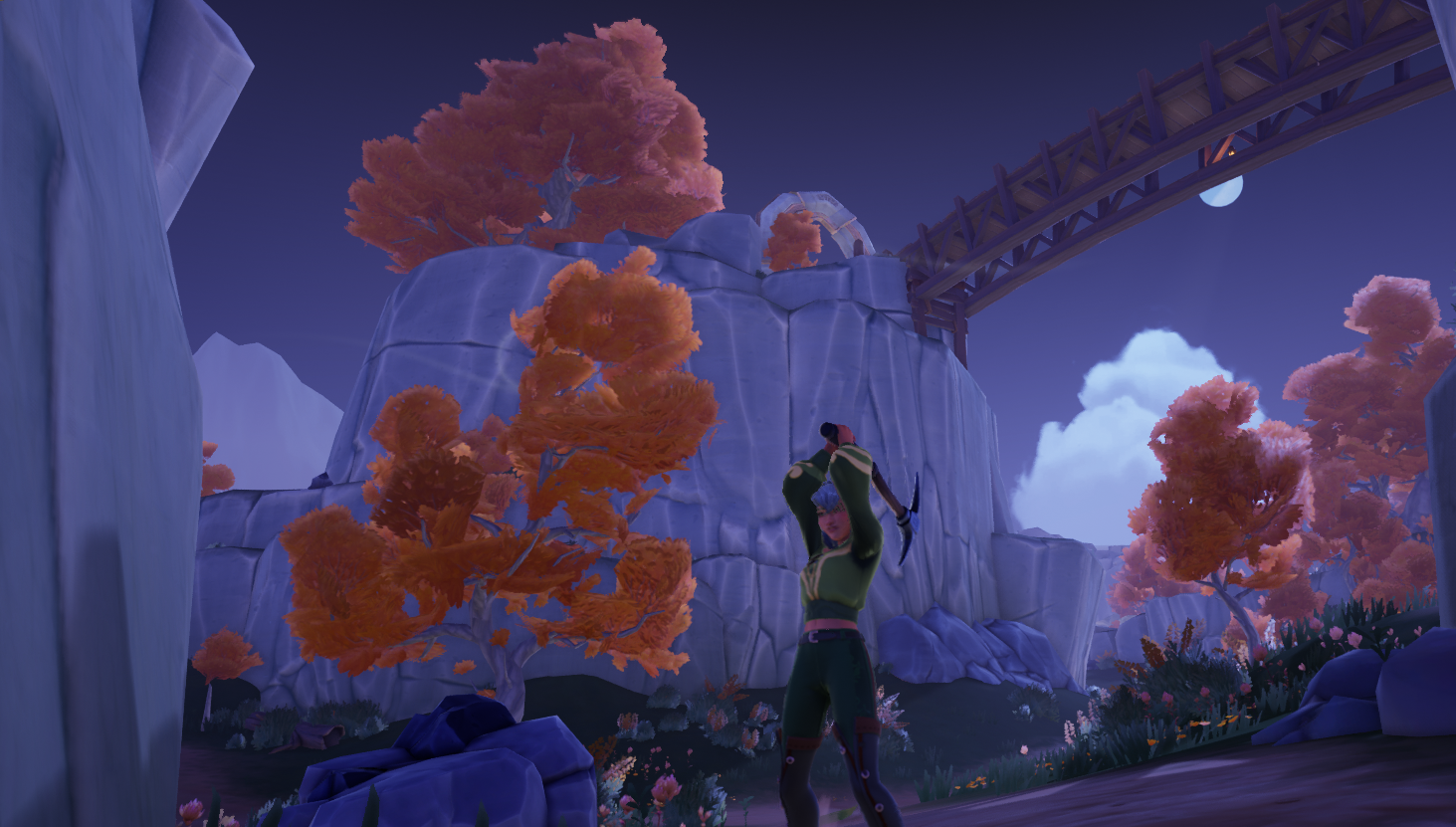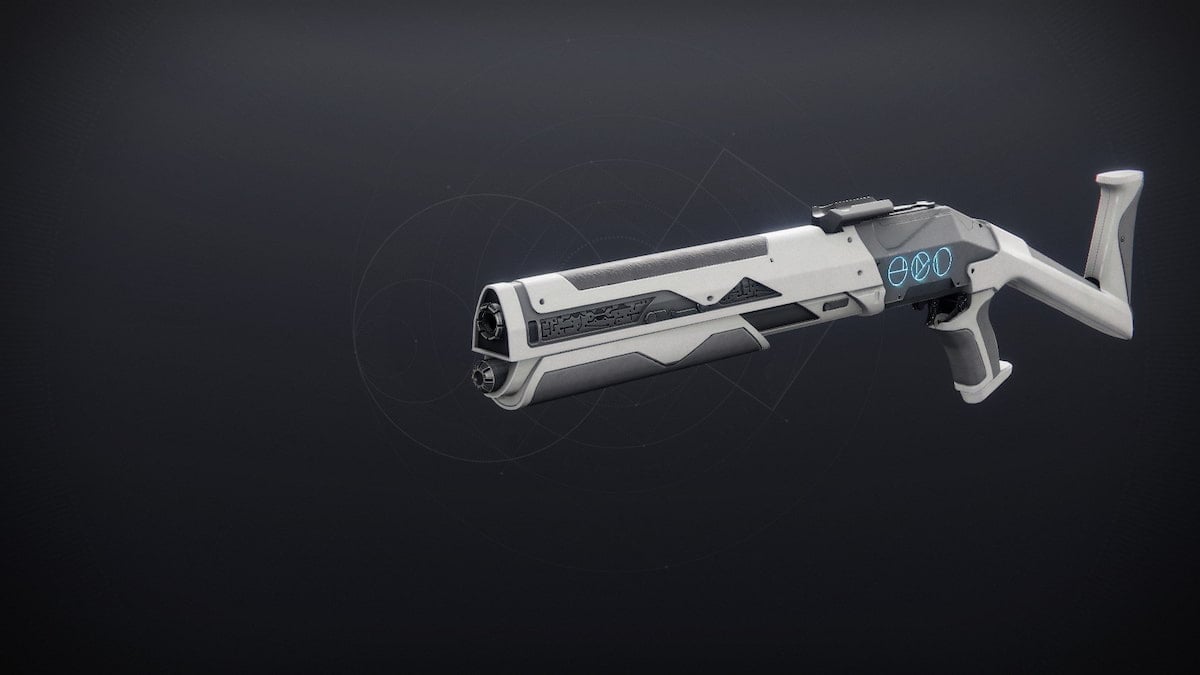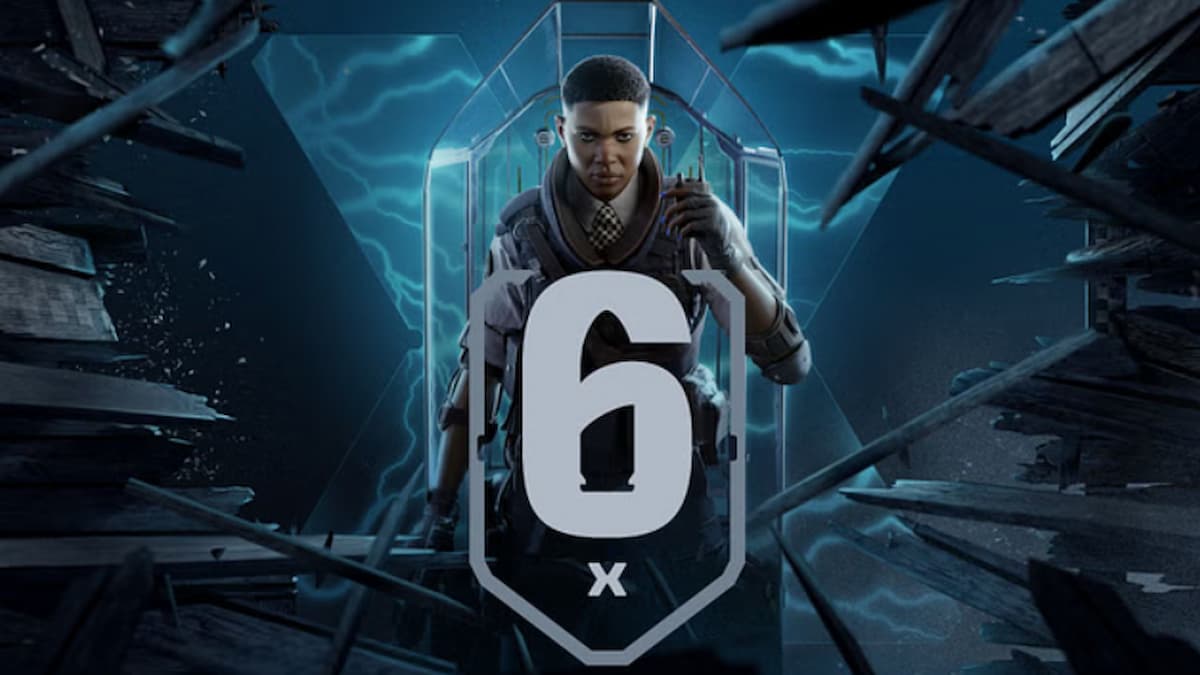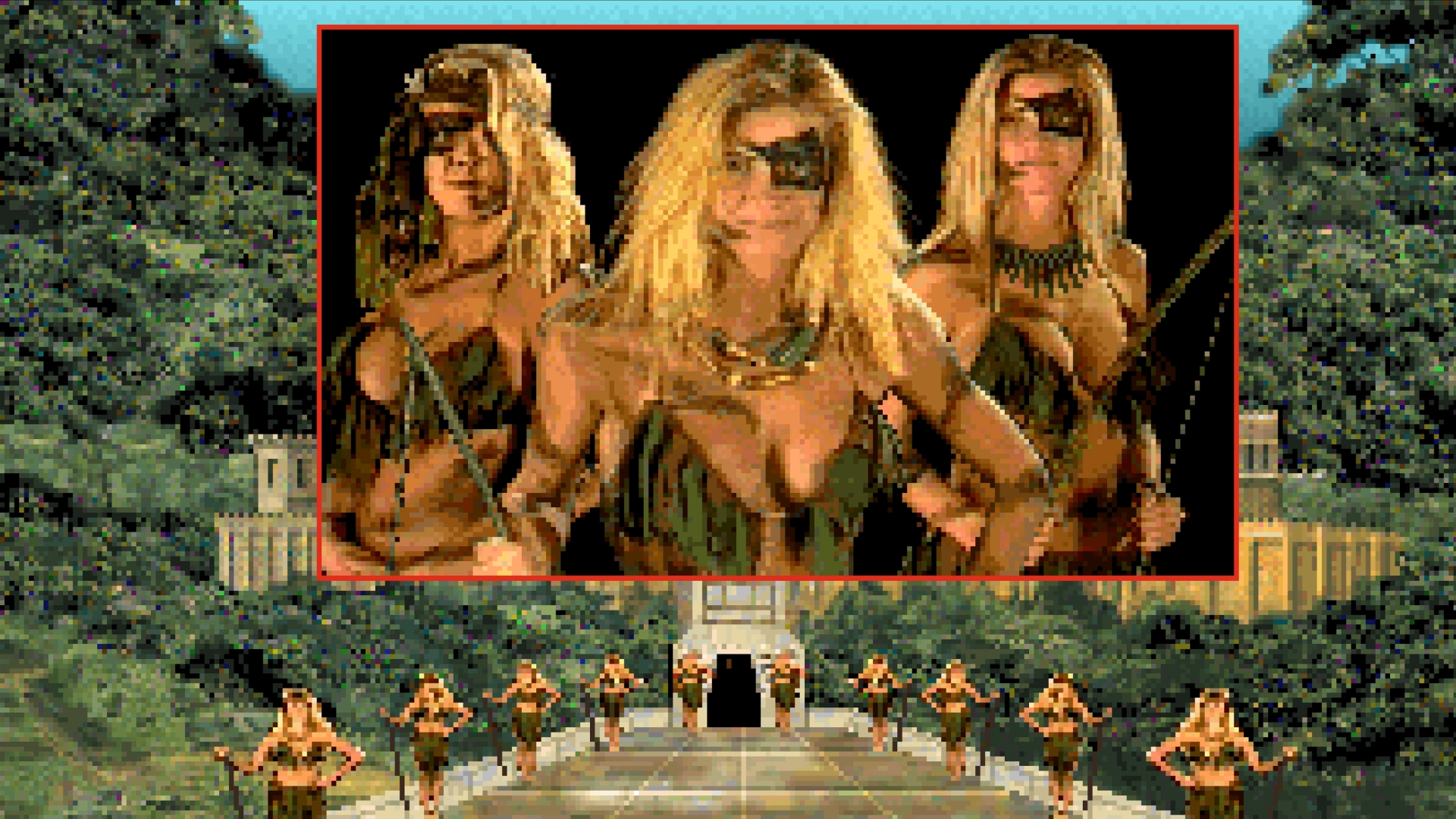
We're rerunning Richard Cobbett's classic Crapshoot column, in which he rolled the dice and took a chance on obscure games—both good and bad.
From 2010 to 2014 Richard Cobbett wrote Crapshoot, a column about rolling the dice to bring random games back into the light. What happens when a company wants to make an interactive movie long before the technology is available? Pain, mostly. Pain, and regret.
I’ve always had a bit of a soft spot for FMV. I remember it when it was the impossible technological dream, the future of gaming, the disappointing present, and then the best-forgotten past, and honestly it made the jump to the second half of that with good cause. Still, there’s something so endearing about the goofiness of a green screen—amateur actors desperately trying to carry stories by first-time scriptwriters and all. I still look back on them a little fondly. But Amazon: Guardians of Eden? Amazon was an interactive movie that couldn’t even wait for CD-ROM. Be afraid.
OH MY GOD I AM EXPRESSING SURPRISE BECAUSE I WAS JUST SURPRISED AND THAT IS WHAT I WOULD DO!
Access Software, as we’ve seen before, was a weird company. Their bread and butter ended up being golf simulators, the Links series, which was ultimately why the company got picked up by Microsoft and closed a few years later after everyone realised golf is boring. What made them interesting were the other games they did, most famously the Tex Murphy interactive movies that saw employees (led by writer/director/star Chris Jones, Access’s money guy turned green screen detective) joining such high-powered names as Margot Kidder to truly redefine the word “starring”.
OK, so that’s a bit catty. They were hammy, but really fun with it, as well as bringing a 3D element to adventure gaming I’m genuinely sad never took off more than it did. Unless you count Normality and Conspiracies. (But don’t.) Before those games though, Access had a couple of other cracks at the whip, including the original, much less advanced Tex Murphy games, spy thriller Countdown, and this, a tribute to the classic adventure serials of old that somehow managed to have slightly worse acting and technology.
I’d explain, but I think you really need to see. The background is simply that our heroes, Jason and Maya, are escaping from the baddies, with the only route being to cross a broken bridge. The result is, I think we can agree, the Citizen Kane of gaming. Movie technology gets no better than this.
You probably need a moment to recover from the drama. It’s OK. I’ll wait.
Amazon, an adventure designed in wilful disregard of everything ’90s adventures did to not suck.
But wait. Who’s Jason? Who is Maya? We should probably go rewind a little, or indeed, a lot. Amazon is the story of Jason Roberts, man with no real personality, whose more interesting brother Allen has been having adventures in the Amazon while Jason works in a lab. Allen gets attacked and goes missing, with Jason’s boss sympathetic enough to offer him some time off to get over it. “Take the whole day if you feel it’s absolutely necessary.” But! When Jason gets home, he discovers a mysterious package that with a mysterious message with a mysterious code all wrapped in mysterious twine, and—
“Dear Jason, If you’re reading this your mouth is open. You look ridiculous. Allen.”
Wow. And people say Telltale game episodes are short. Well, see you next week!
No, of course not. In trying to be an adventure serial, each of Amazon’s chapters is split up as if you walked off for a week between chapters, as opposed to reality, where you’d probably never have gone into the cinema ever again. Even this short burst brings more headscratching than some whole games.
My favourite is that every time you die, the game restarts with Jason in the parking lot of work and the caption “Six weeks later…” making it feel like every time he dies, a clone is taken out of a tank and sent to go pick up his work where he left off, only to find the secret message and get killed and trigger the next clone that goes in and finds the message and gets killed and then triggers the next clone that goes in and finds the message and gets killed and then triggers the next clone that goes in and finds the message and gets killed and then the sane player screams and goes to a temple to meditate on how much better the world would have been if they’d bought Monkey Island instead.
Largely it’s the little things that make it so unpleasant to play, from the increasing number of deaths that can best be described as “bullshit” to the footstep sound that makes it sound like Jason is farting his way through the entire Amazon, to moments of design that just confuse and bewilder. When he gets back to his house for instance, a package is waiting inside. But you can’t pick it up, because that makes sense. Instead, you have to find a letter opener and bring that to the parcel, at which point Jason just dumps everything out on the floor exactly like a sane person wouldn’t. And then there’s my favourite bit of weirdness. When you die, you get a death screen. But before that… you get this.
Wow. These death scenes must be brutal! Dare we witness one?!
Therapy is available if anyone feels particularly mentally scarred.
Yeah, not exactly Waxworks, is it? What’s that? You don’t know what Waxworks is?
This. This is Waxworks. You’re welcome.
All of this comes together to make a game that has absolutely no idea what it is, being too silly to be a thriller, not silly enough to be a comedy, and not trying to be so bad it’s good. Which is lucky, because it is absolutely horrible. It’s a game where your brother’s secret message is encoded using—seriously—a “Little Orphan Annie decoder ring”, as if that counts as cryptography, and the main character’s comments… well, just take a look at how he sees two guards blocking him from a secret base. I quote:
“The blonde haired, ruggedly handsome, powerful guard. He strikes fear in the hearts of those who would steal American technological secrets. His life, however, is missing the love of a good hearted woman.”
Very precise. And the other guard? Psychic powers activate!
“This fun loving woman is a credit to her community. Her heart is filled with love and desire for the male guard, but he is dedicated to his career and seeks no romantic ties. Is there a way to get them together?”
And here’s the thing. That’s a puzzle clue. The puzzle being to take this information the main character couldn’t possibly know, and make a love potion. Which he administers—wait for it—with a blow gun.
You know, I have no idea what’s going on any more.
Then? Then he has to deal with a robot. Which you do by putting a rubbish bin on your head so that it thinks you’re its replacement and walks away. This chapter is called “Heavy Metal Monster” incidentally, presumably because “Stupidest Shit Ever” had to be saved for the later chapters.
Just wait. Juuuuust wait. The idea of Amazon is clearly to combine all the hamminess and tropes of these serials, but the result is really more like someone ate them, stuck a finger down their throat and vomited them up.
But, plot. It takes a while to get going, partly because all Allen explains in his letter is “I’m in trouble”, but mostly because the magic decoder ring you need to find out details is a single pixel in a cluttered living room because Access hates you. Even then, all it really says is “Go to Cuzco, Peru, and all will be explained.” Which is a bit rubbish. Surely a “Sorry for making you fight a robot” wouldn’t have gone amiss. There’s also a bit of a clue dropped about the final goal with talk of giant emeralds called “The Eyes of the Jaguar”, which seem relevant for two reasons—being on a heavily protected microfiche guarded by 1950s robot monsters, and more importantly, being in the game’s logo. Ahem.
Well, one is. Otherwise this would be Amazoon, and that would just be silly!
Whenever you have treasure, though, you have arseholes who want that treasure. In the case of Amazon: Guardians of Eden, that duty falls to one Colonel Sanchez, who the game describes as “a tall, fat policeman”, and players as “Wait, this is our villain? Seriously? This guy?”
I’d put in a clip, but his accent is so bad, so stereotyped, so painful that it actually manages to transcend the audio itself. We’ll see him later, but for now, just imagine how he’d talk—worst case scenario stuff—and later on, we’ll see if you were right.
Truly, a villain so greasy, it’s a wonder he can keep a grip on his gun.
The weird thing about Amazon’s pacing is that it’s simultaneously really quick and super-slow, the former because it whisks you from thing to thing without the time to think, and the second because it’s full of pixel hunting and bullshit deaths where failing to find the necessary pixel in a previous chapter rears up and bites you hard out of absolutely nowhere.
Most puzzles are also on an insanely brutal timer, and largely pointless. From leaving Jason’s workplace in Chapter 2 for instance, it’s not until the end of Chapter 6 that he finally completes his destination to find someone who can tell him about Allen’s disappearance. And what does she do then? Ask questions about him, including what year he won a trophy, that you’d only know from having anally examined every pixel back at the very start of the game, because this is Amazon: Guardians of Eden and Amazon: Guardians of Eden is pure goddamn evil in a can.
On the plus side you do get to feed this baddy enough peppers to make his face explode.
After a needlessly awful trek involving chartering a plane with a pilot who by the sheerest of crappy luck turns out to be on Sanchez’s payroll and sorting out the guy above in his little village, Jason finally does discover his brother Allen. Allen has a life expectancy of exactly four scenes at this point, because there’s a pretty girl with him and absolutely nothing is going to get in the way of a romantic sub-plot. Not even the fact that both she, Maya, and Jason are as charismatic as decapitated Ken and Barbie dolls.
While he lives though, he does explain the plot—that he was sent to the rainforest to investigate forest regeneration in previously destroyed parts, and along the way heard about a valley with magical rejuvenating water. Unfortunately Sanchez was on their trail, and soon enough attacked the camp. Allen got away, demonstrating that against all odds he actually can act as if his life depends on it. Now that the brothers are together though, nothing will stop them saving the day together.
That Maya is a native of these parts? You’re right. All the bullshit.
Or, not. Because this is where we came in. Remember the bridge?
If you don’t use the vine before crossing the bridge you die, despite not being able to see the hole you need to repair before you cross. You repair the bridge with a vine because… uh… um… uh… no, I’ve got nothing. The vines are only holding up the sides of the bridge, the bridge itself is, well, wood. And so what if there’s a hole? If it can be fixed with a vine, it can be stepped over. This is the worst demonstration of bridge maintenance since the one that couldn’t support the weight of the fat guy in Where Time Stood Still.
Allen is arguably the lucky one, because at least he’s spared the rest of the game. It’s mostly just Stuff rather than actually telling a story, best shown by how it immediately gets side-tracked by slave traders who want Maya for their collection. This being Amazon: Guardians of Eden though, it couldn’t stick with just basic sexism. No, it had to go racist as well. Access was based on Salt Lake City, Utah, which isn’t exactly the most multicultural place on the Earth. So what do you do when you’re making a game where you need lots of ethnic people? Apparently, you watch Short Circuit 2 and then go out and buy some boot polish, possibly with the money from pawning your last dregs of shame.
In the words of Socrates: What the shit, people?
Later on, you find a tribe of natives who insist you prove that you’re a god. How do you do that? Fireworks. You launch fireworks, and for the millionth time the credulous natives don’t respond “Good trick, but we know what tools are and we saw you doing stuff with your hands. You know what our favourite trick is? Making impossibly sized cooking pots to turn charlatans into soup. We know it’s a little bit living down to expectations, but sometimes you can’t beat the classics. Do us a favour and shove this carrot up your arse for flavouring.”
But, like Allen’s fate, this would still have been better than the alternative.
NO! NO! NO! NO! NO! NO! NO! NO! NO! NO! NO! NO! NO!
This is what Hell looks like. Right there. That is where the bad people go when they die, to forever be trapped in a minigame that makes an eternity of dental work, a saxophone reed under every finger nail, a complete copy of the Myst series, look like a blessed joy. It doesn’t look like much. It’s slow-paced. It’s quite pretty. All you have to do is travel down the river. But no. Hell. Actual, literal Hell.
You see, the river is full of rocks which you have to avoid, and you might notice that the canoe you have to do it with is practically the size of the screen. There’s no health bar. One touch means instant death, and instant death in Amazon means an unskippable “SHOCK WARNING!” message, death picture, and then intro screen and shot of Jason going to work. Every. Single. Time.
But it gets worse. The foreground completely obscures everything you have to avoid, the few pixels of it that you actually can, when the perspective doesn’t fool you into thinking you’re fine rather than on a collision course with death. WHICH IS ALL THE TIME. All to a soundtrack of screeching monkey noises. Isn’t this the most dickish thing ever?
Yes! But it gets worse! Because this is Amazon, many of the rocks in the river actually set up traps—dead-ends that you can’t see until you’ve sailed into them and have no choice but to crash. You also have to follow a set of directions given in the previous chapter, or you just magically die for having gone the wrong way. Gone the wrong way? On a linear river? No, it doesn’t seem possible. But they found a way! And yes, it’s a really long sequence. Of course it is. But wait! There’s more! Because later, you have to do it again, by goddamn trial and funking error. At least, if there’s any way to get directions, I have no idea how and every walkthrough I checked just says “We don’t know, just do this.”
And the final cherry on the shit sundae? After this first canoeing bit, you’re taken to a conversation where you… can die. Autosaves? This game came out in 1991. There have been war crimes less deserving of a firing squad armed with torture guns. Do those exist? Invent them! I have need of their services!
Oh, and if you were hoping for a reward… this is the best that the game has to offer. Fan service.
Hiring some busty blonde models for the day: possibly the reason this game was made.
Oh, and that waterfall? The canoeing ends with the boat going right over it, and both Maya and Jason crashing down into a pool. Which Maya knew about and kept to herself as—wait for it—a practical joke. “I suppose I should have warned you, but I thought you might like the surprise!” she tells him. This game. I’m starting a campaign to have every copy of this game loaded onto a rocket and fired into the sun.
By gaming law though, Jason has now seen her naked, and therefore it is Love. It’s just the rule. Max Payne 2, Broken Sword 4, there’s no arguing with science. She finally comes clean on who she really is, which is a member of a tribe charged with protecting the land against all those who might destroy it, which of course means, “men”. She promises however that she’ll be the one to say “not all men” and vouch for him, giving him at least a slight chance that they won’t just cut off his dick, make him eat it, and then stab him through the dick-wound with a spear. Jason is thrilled.
And then Sanchez appears and shoots her.
I can’t do justice to what happens next with just text. But wow. If you thought the bridge was good…
And now we know what the opposite of a ‘special effect’ looks like.
With the villain of the piece deadwho has appeared maybe twice in this whole game and Jason has never actually met directly—it’s time to end this turkey by meeting her tribe, the titular Guardians of Eden. And by ‘titular’, I mean of course…
…that their name is in the title of the game.
Also, if you check the credits, you find that their names include—quoting here—Denise Goodbod, Candy Barr, and Dixie Kupps. Also Kerri Sluge, who really should have considered looking into a stripper name even if she worked in data processing or something. Anything but that.
Incidentally, I know it can’t be easy to stand in front of a screen wearing ridiculous Amazon costumes and actually say the line “Take him to the pit of death!”, but it really says something about Amazon’s attention to detail that the lead Amazon actually cracks a smile during it and nobody could be bothered to do a second take. Or, maybe it’s more appropriate than it seems. Let’s find out. What’s in the Pit of Death?
A… killer ant. Of course. Of course a giant killer ant. Totally sensible!
In time-honoured tradition, Jason demonstrates to the suspicious Amazon women that he is not one of those violent, murderous kinds of men who means harm to Mother Nature and all her children by spearing the ant through its fucking thorax.
As such, instead of killing him right back, they decide “OK, sure, whatever,” and give him the greatest gift that not much money in the 1990s could buy—a little more fan-service, and an ending so toe-curling, an army of podiatrists won’t be able to help you walk straight after watching it.
Oh. Good. Grief. So much awful, such little time. It’s somewhat hard to imagine Jason making an awesome life for himself in the City of Misandry here, single solitary tear or not, and if you’re wondering if Maya has done anything in this adventure to warrant him choosing her over the emerald, the answer is “haha, no.” The whole game ends with everything resolved but nothing actually accomplished; the secret of the Amazons remaining exactly that, when the whole thing could have been sorted out by shooting Sanchez in the neck with a blow-dart. And even then, it’s only a half-secret, since Allen was paid to come on this trip and his employers have no reason not to send another explorer.
Really, I suspect that Jason’s main reason to stay is that if he went back, he’d have to take another trip on a canoe. And suddenly his decision makes perfect sense. Goddamn, that minigame.
Not that there’s any shortage of ways to die elsewhere. SHOCK WARNING!
Be grateful that just a few years later, Access finally managed to twist its desire to create movie games into a genuinely great one—The Pandora Directive—and carve out a cult following that would ultimately allow for a new Tex Murphy. Amazon was a dreadful dreadful game, but as a series-killing Australian once said, things could get worser.
